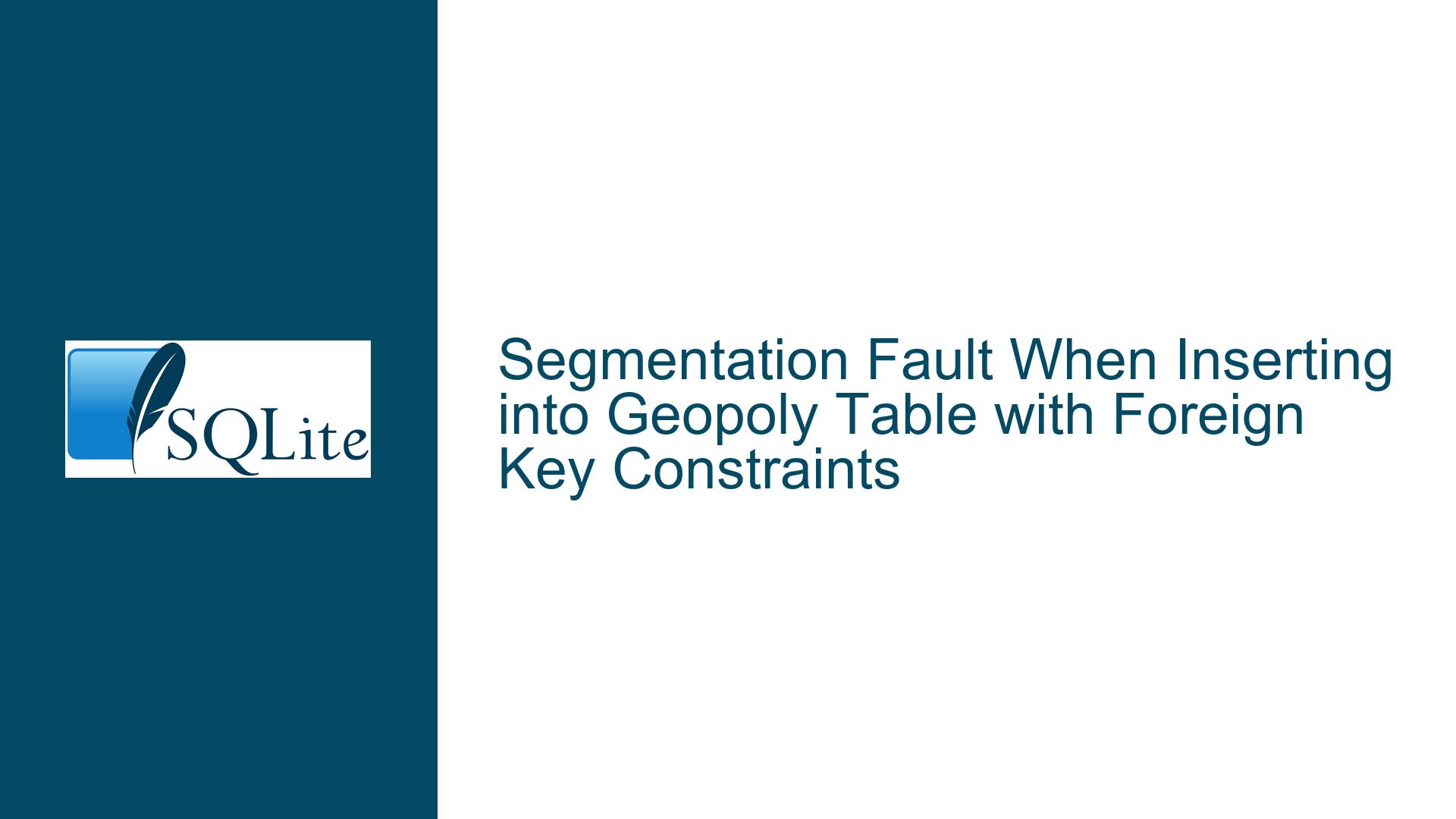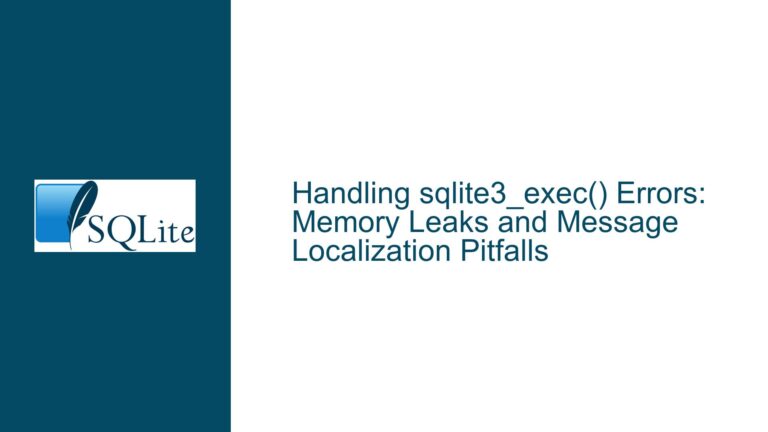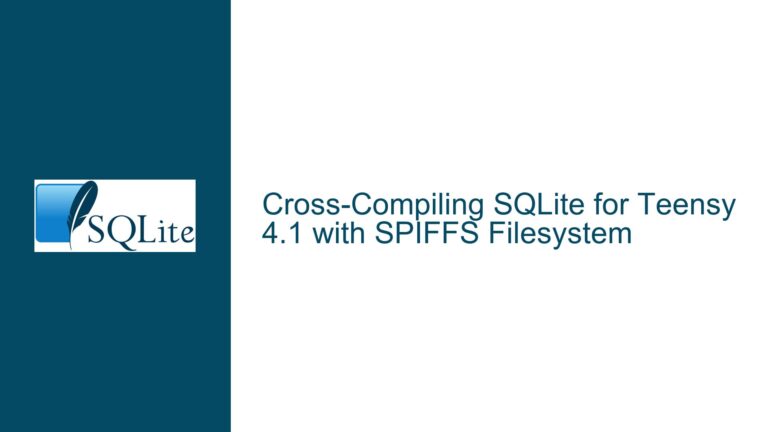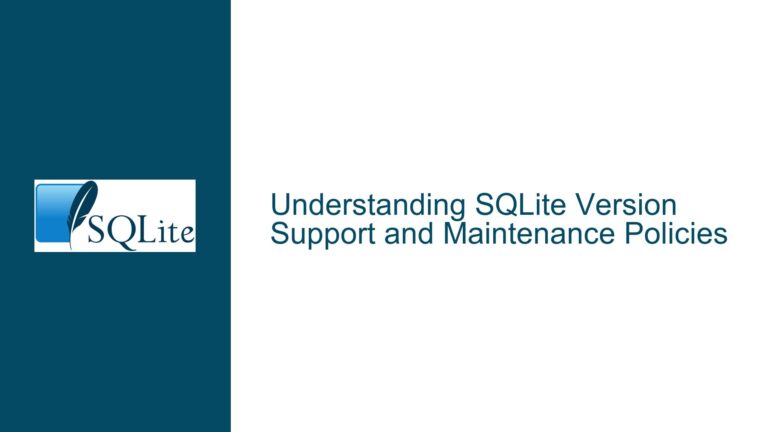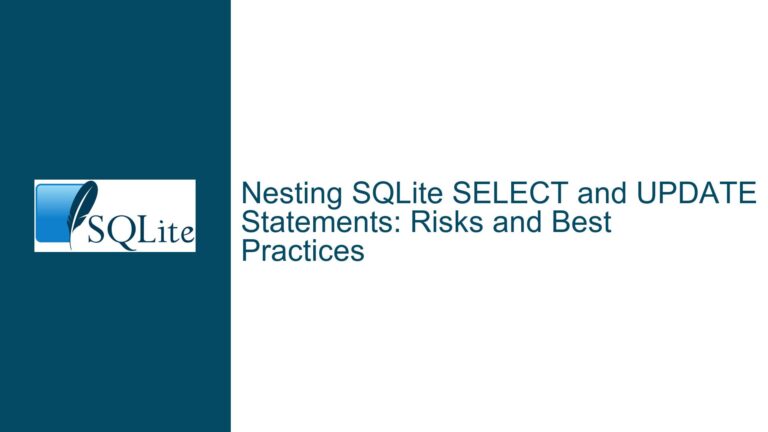Segmentation Fault When Inserting into Geopoly Table with Foreign Key Constraints
Segmentation Fault in Geopoly Virtual Table During INSERT Operations
The core issue involves a segmentation fault (segfault) triggered when attempting to insert data into a virtual table created using SQLite’s Geopoly extension. The problem manifests specifically when the Geopoly table schema includes a FOREIGN KEY constraint that references another table. The segfault occurs during the execution of the INSERT INTO mt_area statement, as evidenced by the provided GDB backtrace pointing to failures in sqlite3_bind_value() and geopolyUpdate(). The underlying cause is a misinterpretation of schema constraints by the Geopoly module, leading to invalid memory access during row insertion.
This issue arises from the interaction between Geopoly’s internal handling of column definitions and SQLite’s foreign key enforcement mechanisms. Geopoly virtual tables are designed to manage spatial data using a specialized R-Tree index structure for polygon geometries. However, the extension does not natively support foreign key relationships, and attempts to declare them in the Geopoly table schema result in undefined behavior. The segmentation fault is a direct consequence of the Geopoly module incorrectly processing the foreign key declaration as if it were an ordinary column or auxiliary data field, leading to memory corruption when binding values during insertion.
The problem is reproducible in SQLite versions prior to the fix implemented in 3.39.2. The crash occurs consistently when the following conditions are met:
- A Geopoly virtual table includes a FOREIGN KEY clause in its schema definition.
- An INSERT statement attempts to populate both the spatial data column (
_shape) and the foreign-key-associated columns (mt_id,locations_idin this case). - The SQLite environment lacks runtime checks to prevent incompatible constraints on virtual tables.
The segmentation fault indicates a low-level memory access violation, typically caused by dereferencing null pointers, accessing freed memory, or buffer overflows. In this context, the Geopoly module’s update hook (geopolyUpdate) attempts to bind values to non-existent auxiliary columns erroneously created due to the foreign key declaration. This mismatch between expected and actual schema metadata destabilizes the SQLite VM (Virtual Machine) during query execution.
Foreign Key Constraints Misinterpreted by Geopoly Virtual Table
The root cause of the segmentation fault lies in how the Geopoly extension parses and implements table schemas. Unlike conventional SQLite tables, virtual tables such as those created with Geopoly do not fully participate in SQLite’s foreign key enforcement infrastructure. When a FOREIGN KEY constraint is declared in a Geopoly table’s schema, the extension misidentifies it as an auxiliary column definition. This misinterpretation cascades into incorrect memory allocation and binding operations during data insertion.
Geopoly virtual tables rely on a fixed set of internal data structures to manage spatial indexing. When a Geopoly table is defined with USING geopoly(...), the arguments within the parentheses are intended to specify auxiliary columns – additional data fields stored alongside the spatial index. These columns are managed by the Geopoly module itself, not by SQLite’s core foreign key system. The foreign key declaration in the original schema (FOREIGN KEY(mt_id, locations_id) REFERENCES mt_locations(mt_id, locations_id)) is incorrectly parsed as an auxiliary column named "FOREIGN KEY(mt_id, locations_id)", which does not correspond to any valid Geopoly column type.
This parsing error leads to several critical failures:
- Metadata Mismatch: The Geopoly module’s schema parser does not recognize FOREIGN KEY clauses as constraints. Instead, it attempts to create auxiliary columns using the entire constraint declaration as a column name. This results in an auxiliary column with an invalid name and undefined storage requirements.
- Binding Collisions: During the INSERT operation, the Geopoly module tries to bind values to the non-existent auxiliary column derived from the foreign key declaration. Since this "column" was never properly initialized, the binding operation accesses invalid memory addresses, causing the segfault.
- Index Corruption: The Geopoly module maintains internal indexes (mt_area_rowid, mt_area_node, mt_area_parent) to manage spatial data. The foreign key misinterpretation disrupts the linkage between these indexes and the application data, leading to inconsistent internal state management.
The problem is exacerbated by SQLite’s leniency in schema validation for virtual tables. Unlike ordinary tables, where foreign key constraints are enforced at schema creation, virtual tables delegate constraint handling to their respective modules. The Geopoly extension lacks logic to detect or process foreign key declarations, resulting in silent schema corruption rather than explicit error messages.
Resolving Geopoly INSERT Crashes via Schema Adjustments and Version Updates
To resolve the segmentation fault and ensure reliable insertion into Geopoly tables, implement the following corrective measures:
1. Remove Foreign Key Constraints from Geopoly Table Definitions
Modify the Geopoly virtual table schema to exclude FOREIGN KEY declarations. Since Geopoly does not support foreign key constraints, these must be enforced at the application level or through companion tables. For the provided schema, revise the CREATE VIRTUAL TABLE statement as follows:
Original Schema with Foreign Key (Crash-Prone):
CREATE VIRTUAL TABLE mt_area USING geopoly(
mt_id INT,
locations_id TEXT,
FOREIGN KEY(mt_id, locations_id) REFERENCES mt_locations(mt_id, locations_id)
);
Revised Schema without Foreign Key (Stable):
CREATE VIRTUAL TABLE mt_area USING geopoly(
mt_id INT,
locations_id TEXT
);
After removing the foreign key clause, recreate the table and ensure that referential integrity is maintained through application logic or triggers. For example, create a trigger to validate mt_id and locations_id against mt_locations before insertion:
CREATE TRIGGER validate_mt_area_fk
BEFORE INSERT ON mt_area
BEGIN
SELECT RAISE(ABORT, 'Invalid mt_id or locations_id')
FROM mt_locations
WHERE mt_locations.mt_id = NEW.mt_id
AND mt_locations.locations_id = NEW.locations_id;
END;
2. Upgrade to SQLite Version 3.39.2 or Later
The SQLite development team addressed this specific issue in version 3.39.2. The fix involves enhanced schema parsing logic in the Geopoly module to ignore foreign key declarations and prevent their misinterpretation as auxiliary columns. Upgrade your SQLite installation using one of the following methods:
- Download Prebuilt Binaries: Obtain the latest SQLite binaries from the official website (https://sqlite.org/download.html).
- Rebuild from Source: Clone the SQLite source repository, check out the
branch-3.39or later, and compile the amalgamation with geopoly support enabled:wget https://sqlite.org/src/tarball/sqlite.tar.gz?r=release -O sqlite.tar.gz tar xzf sqlite.tar.gz cd sqlite ./configure --enable-all --enable-geopoly make
After upgrading, recreate the Geopoly table with the revised schema (excluding foreign keys) and verify that inserts no longer cause segmentation faults.
3. Validate Geopoly Schema Definitions
Ensure that all columns declared in the Geopoly virtual table are either the implicit _shape column or explicit auxiliary columns. The Geopoly module supports the following column types:
- INT
- INTEGER
- REAL
- TEXT
- BLOB
Any other declarations (including constraints like UNIQUE, CHECK, or FOREIGN KEY) must be avoided. Use the .schema command in the SQLite shell to audit existing Geopoly tables for invalid constraints:
sqlite3 your_database.db ".schema mt_area"
If foreign key or other constraints are present, drop and recreate the table without them:
DROP TABLE mt_area;
CREATE VIRTUAL TABLE mt_area USING geopoly(mt_id INT, locations_id TEXT);
4. Implement Foreign Key Enforcement via Companion Tables
To maintain referential integrity without relying on Geopoly’s unsupported foreign keys, create a companion table that mirrors the Geopoly table’s key structure and enforces foreign key constraints:
CREATE TABLE mt_area_fk_enforcer (
mt_id INT,
locations_id TEXT,
FOREIGN KEY(mt_id, locations_id) REFERENCES mt_locations(mt_id, locations_id),
PRIMARY KEY (mt_id, locations_id)
);
CREATE VIRTUAL TABLE mt_area USING geopoly(mt_id INT, locations_id TEXT);
CREATE TRIGGER mt_area_fk_insert
BEFORE INSERT ON mt_area
BEGIN
INSERT OR ROLLBACK INTO mt_area_fk_enforcer (mt_id, locations_id)
VALUES (NEW.mt_id, NEW.locations_id);
END;
CREATE TRIGGER mt_area_fk_update
BEFORE UPDATE OF mt_id, locations_id ON mt_area
BEGIN
DELETE FROM mt_area_fk_enforcer
WHERE mt_id = OLD.mt_id AND locations_id = OLD.locations_id;
INSERT OR ROLLBACK INTO mt_area_fk_enforcer (mt_id, locations_id)
VALUES (NEW.mt_id, NEW.locations_id);
END;
CREATE TRIGGER mt_area_fk_delete
BEFORE DELETE ON mt_area
BEGIN
DELETE FROM mt_area_fk_enforcer
WHERE mt_id = OLD.mt_id AND locations_id = OLD.locations_id;
END;
This approach decouples the spatial data storage in mt_area from the referential integrity checks in mt_area_fk_enforcer, ensuring crash-free inserts while preserving data consistency.
5. Test with Simplified Schemas and Queries
Before deploying schema changes to production, validate the Geopoly table’s behavior using minimal test cases. For example:
CREATE VIRTUAL TABLE t1 USING geopoly(a INT, b TEXT);
INSERT INTO t1(a, b, _shape) VALUES(1, 'test', '[[0,0],[1,0],[1,1],[0,0]]');
If this basic insert succeeds, gradually reintroduce additional columns and constraints while monitoring for stability. Use debugging tools like GDB or Valgrind to diagnose memory issues during testing:
gdb --args sqlite3 test.db
(gdb) run < test_script.sql
6. Audit Geopoly Index Consistency
After resolving the segmentation fault, verify the integrity of Geopoly’s internal indexes (mt_area_rowid, mt_area_node, mt_area_parent). Run integrity checks using custom queries:
SELECT
(SELECT COUNT(*) FROM mt_area_rowid) AS rowid_count,
(SELECT COUNT(*) FROM mt_area_node) AS node_count,
(SELECT COUNT(*) FROM mt_area_parent) AS parent_count;
Compare these counts against the expected number of rows in mt_area. Use the geopoly_bbox() and geopoly_json() functions to validate spatial data integrity:
SELECT geopoly_bbox(_shape), geopoly_json(_shape) FROM mt_area;
By systematically addressing schema misinterpretations, upgrading SQLite, and implementing alternative referential integrity checks, the segmentation fault during Geopoly inserts can be reliably eliminated.
